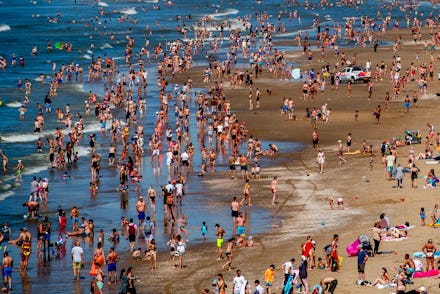Climate change will kill more people than all infectious diseases combined, new study says

Deaths caused by rising temperatures will kill more people than all known infectious diseases combined, and it'll hit poorer and hotter countries the hardest, a bleak new study has warned. The report, published by the National Bureau of Economic Research, paints a dire picture of our future if we don't treat the climate change crisis like a health crisis. Places in the Middle East and Africa could see as many as 200 deaths per 100,000 people by the end of the century due to extreme heat. And, just like the pandemic, vulnerable populations like the elderly and people with pre-existing health conditions will be at greater risk of dying.
The study is the first comprehensive calculation of estimated deaths caused by increasing global temperatures, claim the authors of the report. Up until now, much research on the economic impact of climate change hasn't really taken into account how countries would adapt or how much the mortality rates would cost as the Earth's temperatures continue to rise. The team, mostly consisting of environmental economists, set out to quantify the consequences of climate change by using mortality data from 41 countries (approximately 55 percent of the global population).
The researchers found that in a "moderate" climate change scenario each ton of CO2 spewed into the environment would cost about $17.10. A worst-case scenario, in which high levels of carbon emissions cause global temperatures to rise over 3 degrees Celsius, would cause damages costing about $36.60. In this same scenario, the loss of life could cost 3.2 percent of the global GDP by 2100.
"You see the really bad impacts at the tropics," environmental economist Amir Jina, co-author of the study, told The Guardian. "There's not one single worldwide condition, there's a lot of different changes with poorer people much more affected with limited ability to adapt."
Richer countries will have an easier time adapting, at first, because their residents are more likely to have the money to buy air conditioners or cities can designate cooling centers during scorching days. Places that are already used to regular seasons of heat will have to splurge less.
"A really hot day in Seattle is more damaging than a really hot day in Houston because air conditioning and other measures are less widespread there," co-author and climate scientist Bob Kopp explained to The Guardian.
In the opposite direction, northernmost countries that tend to see deaths due to extreme cold will notice their mortality rates lowering as temperatures become more moderate. Poorer countries might not be able to adapt at all, which could spur drastic human migrations to places with better climates.
"The richer countries, even if they have increases in mortality, can pay more to adapt to it. It's really the people who have done the least to cause climate change who are suffering from it," added Jina.
Jina cautioned that failing to address climate change before it causes incredible harm could put governments and various infrastructures under massive pressure in ways similar to the Covid-19 pandemic. If that occurs, "it's hard to tell what will happen" and whether we'll be able to adapt quickly enough to stop a massive number of preventable deaths.
Given the current struggle with coronavirus, confidence in our ability to handle another health crisis is low. But the researchers found that rapidly cutting down emissions can lower the economic costs of climate change and reduce heat-related deaths to less than a third of the worst case scenario's estimated numbers. So at least there's still some hope for a slightly less catastrophic future.